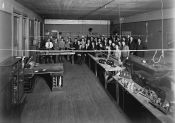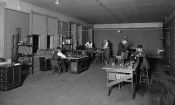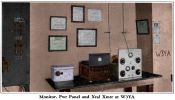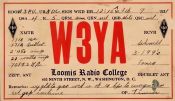|
www.theradiohistorian.org
Copyright
2023 - John F. Schneider
& Associates, LLC
[Return
to Home Page]
(Click
on photos to enlarge)
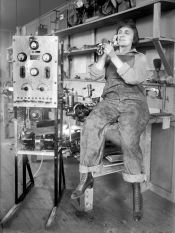
Mary Texanna Loomis, founder of the Loomis Radio School in Washington, D.C., 1921.
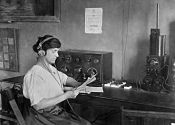
Mary Texanna Loomis operating a radio transmitter.
The Loomis Radio School in Washington, D.C. (Library of Congress photo)
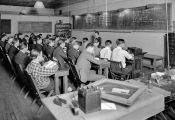
Classroom instruction in the Loomis School (Library of Congress photo)
|
|
In the 1920’s, if you wanted to become a commercial radio
operator or a shipboard radioman, you needed a Commercial Radio License, issued
by the Department of Commerce. The best
way to achieve this was to attend one of the few radio schools that operated in
principal cities around the United States.
Two of the most distinguished schools were located in Washington,
D.C.: the National Radio Institute, and
the Loomis Radio College. This latter
school was particularly noteworthy because of its owner and instructor, Mary
Texanna Loomis. It was the only
woman-owned radio school in the country, and Ms. Loomis was most likely the
country’s only female radio authority.
She was a distant cousin to Dr. Mahlon Loomis, who in 1866
experimented with “stealing current from the atmosphere” using kites and
metallic string. In one experiment, he
flew kites from two peaks of the Blue Ridge Mountains in Virginia and was able
to detect a change in current in a galvanometer in one kite when he grounded
the line of the other kite. Subsequently, he was able to send Morse Code
messages between the two locations – a distance of 18 miles. Notably, he was experimenting in wireless
communication nine years before Guglielmo Marconi was born.
Mary Texanna Loomis was born August 18, 1880, in a
homesteader’s shack near Goliad, Texas, the second child of Alvan Isaac and
Caroline (Dryer) Loomis. Her middle name
was bestowed in honor of the state where she was born. The family moved to Rochester, NY, in 1883,
where she had a respectable middle-class upbringing. She was very sports-minded in her youth, participating
in swimming, horseback riding and strenuous exercise. She took voice lessons and became a good
soprano. She learned to speak three
languages: French, Italian, and
German. Her grandfather was a strong
influence in her life – he taught her to use tools and to build mechanical
devices, and helped develop her interest in science and the new inventions of
the industrial age.
Miss Loomis married Turner Erving Howard in October, 1898,
in Buffalo NY, but the marriage ended in divorce in 1917. It’s not known that she had any children.
After her divorce, she moved to Washington, DC, where she
looked unsuccessfully for music employment, but her life took a new turn when
she attended a lecture on the emerging technology of wireless
communication. Fascinated by the topic,
she proceeded to read everything she could find on the subject. At the age of 38, at a time when radio was
the field of only a select few male experimenters and inventors, she graduated
from radio school and earned her first-class radio telegraphy license.
During World War I, she worked for the Red Cross and as a
secretary in a wireless school. It was
only then that she learned about the experiments of her distant cousin, and she
resolved to open a radio operator’s school in his honor. In 1920, she invested every cent she had and
incorporated the Loomis Radio School. Located
at 401-411 Ninth Street in Washington, DC, it offered a six-month course
preparing students for the first-class commercial radio license exam. Most students who graduated found positions
as shipboard radio operators. Mary
Texanna Loomis was the school’s president and principal lecturer. She taught radio using the equipment that
she constructed herself in the school’s machine shop. She taught her students how to build radio
equipment. “No man can graduate from my
school until he learns how to make any part of the apparatus. I give him a blueprint of what I want him to
do and tell him to go into the shop and keep hammering away until the job is
completed. I want my graduates to be able to meet any emergency or mishap that
may arise someday far out on the sea.”
She lived a frugal life in a boarding home, and worked 12-15
hours a day teaching, grading papers, and writing. The Loomis Radio School offered four courses
– 1. for commercial radio operators, leading to a first-class commercial radio
operators license; 2. technical training
on how to build a receiving set; 3. a
radio amateurs operator’s license course; and
4. a course for operators who
needed to renew their expired license, or for military operators who needed
only minimal training. Her students also
gained practical experience operating a radio transmitter through the use of
the school’s amateur station, W3YA.
In addition to operating the radio school, Ms. Loomis was a
noted lecturer and member of the prestigious Institute of Radio Engineers. She authored and marketed the popular book, “Radio
Theory and Operating for the Radio Student and Practical Operator.” It was a reference text of 886 pages and 700 illustrations,
advertised at a reasonable price and offered postage-paid directly by the
school, which found its place as a textbook used by many educational
institutions and government agencies. By
1928 the Loomis book was in its fifth edition and amounted to 1,006 pages. “Radio Broadcast” Magazine called it “One of
the most comprehensive volumes in its field.” She dedicated her book to her cousin, Dr.
Mahlon Loomis.
The depression of 1929 severely affected the radio school,
as it did tens of thousands of other businesses around the country. Fewer students could afford the training, and
the larger schools like the National Radio Institute had more resources to
weather the hard times. Further, a new
competitor, the Capitol Radio Institute, opened its doors in Washington in
1932. In 1930, she reorganized as the
Loomis Radio College, Inc., but it was dissolved Feb. 3, 1933. By 1936, there is no longer any record of her
school.
Not much is known about Mary Texanna Loomis’ later
life. She is known to have relocated to
San Francisco in 1938, where the census shows that she lived in the St. Francis
Hotel and listed her occupation as a stenographer. She died in San Francisco on June 7, 1960, at
the age of 79, and was buried at the Woodlawn Memorial Park in Colma,
California.
REFERENCES:
-
“National Electragist”, November,
1921: “Woman conducts radio school”, by
H.O. Bishop
-
The Dearborn Independent, December
31, 1921: “Woman conducts radio school”
-
“The American Magazine”, January,
1924: “This young woman founded a radio
school”
-
The Washington Post, March 15,
1931: “Mary Loomis bosses air students
to high success”
-
www.loomis-family.org
-
www.wikitree.com
-
“Mary Texanna Loomis” by W8SU,
2009.
-
“The Spectrum Monitor”, July, 2022: “The First Lady of Radio” by Scott Caldwel
|
